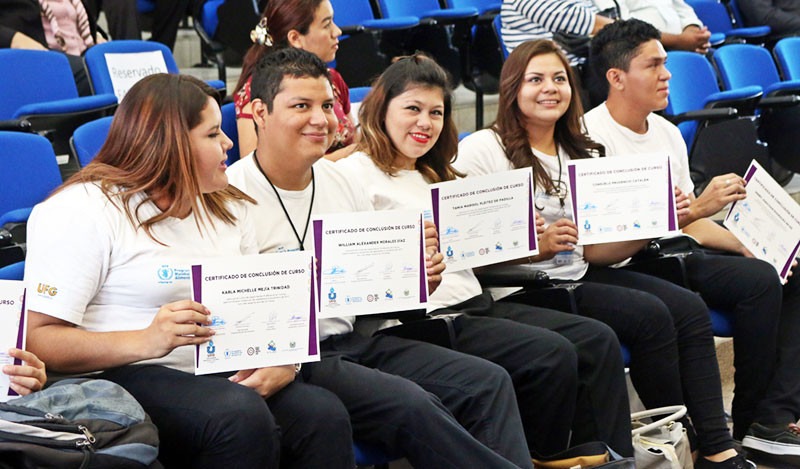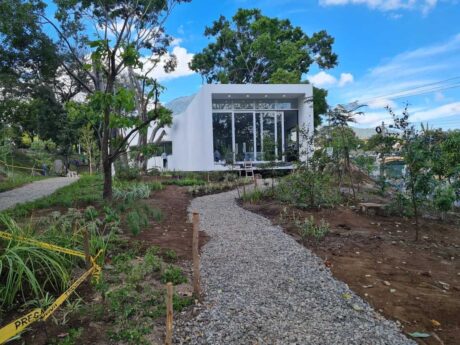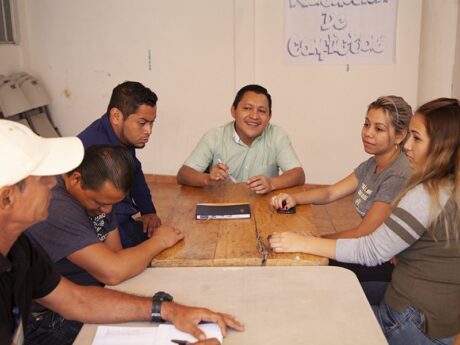San Salvador, El SalvadorWilliam Morales, 28, is one of more than an estimated 26,000 Salvadoran migrants who were returned to the country in 2017. Like many returnees, Morales struggled with employment when he arrived back in El Salvador.
But luckily, he found a path forward – through cooking.
Morales is one of 30 Salvadoran returnees ages 18 to 30 who completed a six-month program through Gastromotiva, a Brazil-based organization that uses culinary training and education to empower at-risk individuals. The Gastromotiva program in El Salvador was supported by a partnership between the World Food Programme and the U.S. Agency for International Development’s Crime and Violence Prevention Project, which is implemented by Creative Associates International.
Between August 2017 and January 2018, Morales and his classmates studied culinary arts and gained work experience at local hotels and restaurants. Morales says that when he began, he was afraid of burning himself on the stove. Now, he’s at ease in the kitchen.
“This project has opened the doors to a new world. I didn’t know anything about cooking,” he says. “But I really discovered a new talent and new knowledge that I can apply to my life, and also learned how to live healthier and contribute to the development of my country.”

A pathway to steady employment
After completing the hands-on training, some students were able to find full-time employment where they can put their new skills to use and earn a steady income.
Morales has begun working at a local cafe that allows him a flexible schedule so he can also attend university classes for part of the day and pursue a degree in English.
“Without this program, I might still be unemployed. But thanks to them I have started a new stage in my life,” he says. “My life really has changed, because I can see that gastronomy can allow me to support myself and my home and to contribute to society.”
Gastromotiva graduate Tatiana López says before she began the program, she wasn’t working or going to school. Now, she too has a full-time job and is furthering her education at university.
“Sometimes young people think that they don’t have opportunities, that they can’t get a job, that they can’t continue their education,” López says. “I would highly recommend this program to them, because it has really helped us greatly, through both information and support. It has really helped us and our families economically.”
Both López and Morales say that while they learned how to be better cooks, they were also learning how to make better decisions for their own lives.
“My experience with this project was great, because they taught us a lot about culinary arts. But I can also say they really helped us in learning about human values, about becoming good citizens,” Morales says.

Tapping into opportunities at home
The El Salvador Crime and Violence Prevention Project works to build more secure communities and lower the risk factors and build resiliency of youth who have the highest likelihood of engaging with criminal activity. The project has established more than 160 youth Outreach Centers across the country, connected high-risk youth with family counseling and worked with dozens of municipalities to help them engage with citizens and reduce crime and violence.
Culinary training is not new to the project – more than 1,300 people have completed cooking courses through various culinary courses in 17 municipalities. But project Chief of Party Javier Calvo says this course’s emphasis on returnees gives more focused attention to a particularly vulnerable group and is building the program’s knowledge about the links between returnees and violence and how targeted prevention activities work.
“Violence is deeply interwoven into social networks in El Salvador, and we need to understand how employment, life skills and social bonds for returnees can lay the groundwork for improved resilience and violence reduction efforts,” he says. “Our hope is that this initiative, by empowering returnees with job and soft skills, will enable them to contribute positively to their communities and reduce risk factors.”
Morales and López can now serve as examples of young people who have persevered through a challenging situation and are on a path to financial stability and self-reliance. For Morales, it has opened his eyes to the potential to find success within his own community.
“Sometimes you make bad choices and decide to migrate for one reason or another outside of the country to look for new opportunities,” he says. “But really, there are opportunities within the country, you just have to take advantage of them.”
With editing by Evelyn Rupert.



